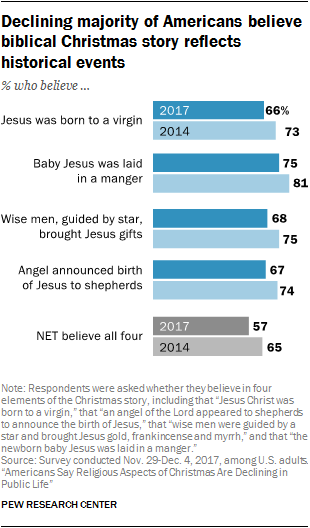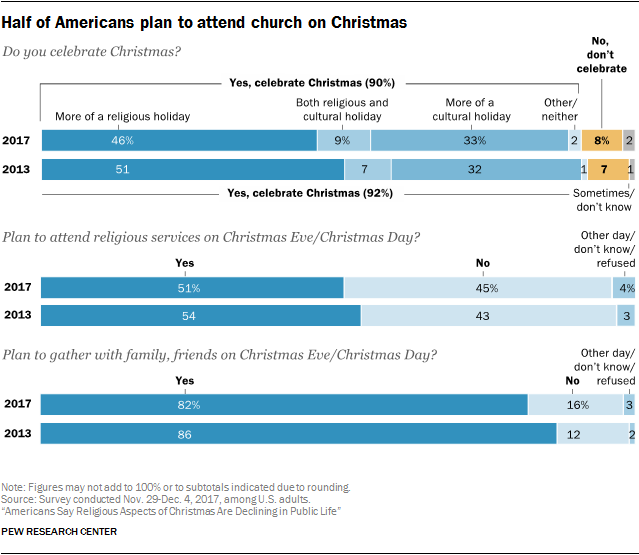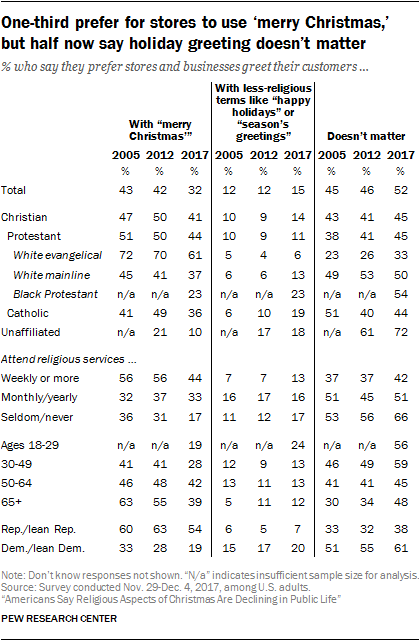Fewer view Christmas as a religious holiday, US study says
There is a decline in the number of adults in the US who believe the biblical Christmas story. Many say it does not matter if they are greeted with “merry Christmas” or “happy holidays”.
Pew Research · WASHINGTON D.C. · 15 DECEMBER 2017 · 10:11 CET

A new Pew Research Center survey shows that most U.S. adults (56%) believe the religious aspects of Christmas are emphasized less now than in the past. Only 32% are bothered by this trend.
The survey was conducted by telephone, between November 29 and December 4, 2017, among a representative sample of 1,503 adults.
BIBLICAL CHRISTMAS NARRATIVE
According to Pew, “one of the most striking changes in recent years involves the share of Americans who say they believe the birth of Jesus occurred as depicted in the Bible”.
There has been a noticeable decline in the percentage of U.S. adults who say they believe that biblical elements of the Christmas story reflect historical events that actually occurred.
Today, 66% say they believe Jesus was born to a virgin, down from 73% in 2014. Likewise, 68% of U.S. adults now say they believe that the wise men were guided by a star and brought gifts for baby Jesus, down from 75%.
And there are similar declines in the shares of Americans who believe that Jesus’ birth was heralded by an angel of the Lord and that Jesus was laid in a manger as an infant.
Overall, 57% of Americans now believe in all four of these elements of the biblical Christmas story, down from 65% in 2014.
DOUBTS AMONG CHRISTIANS
At the same time, the new study finds that even among some Christian groups, there are signs of growing doubts about the Christmas story as relayed in the Bible.
The shares of Christians who believe in the virgin birth, the visit of the Magi, the announcement of Jesus’ birth by an angel and the baby Jesus lying in the manger all have ticked downward in recent years.
Overall, the percentage of Christians who believe in all four of these elements of the Christmas story has dipped from 81% in 2014 to 76% today. This decline has been particularly pronounced among white mainline Protestants.
CHRISTMAS, A RELIGIOUS HOLIDAYS?
And although most Americans still say they mark the occasion as a religious holiday, there has been a slight drop in recent years in the share who say they do this.
Currently, 55% of U.S. adults say they celebrate Christmas as a religious holiday, including 46% who see it as more of a religious holiday than a cultural holiday and 9% who celebrate Christmas as both a religious and a cultural occasion.
About half of American adults (51%) are planning to attend religious services on Christmas Eve or Christmas Day.
Among white evangelicals and white mainline Protestants, the shares who say they will attend religious services this Christmas are somewhat higher than in 2013.
Among Catholics, by contrast, the share saying they will attend Christmas Mass has declined somewhat since 2013, from 76% to 68%.
CHRISTMAS IN PUBLIC LIFE
While most Christians (73%) continue to think displaying religious symbols on government property is acceptable during the Christmas season, Christians as a whole have become less supportive of this position over the last three years.
The change is most pronounced among white evangelical Protestants, who are less likely to favor displaying Christian symbols on government property today (80%) than in 2014 (90%).
Non-religious Americans are divided in their views about religious displays on government property. More than a half think that displaying Christian symbols on government property is acceptable, while 45% say no religious symbols should be displayed on government property.
MERRY CHRISTMAS OR HAPPY HOLIDAYS?
A growing share of Americans say it does not matter to them how they are greeted in stores and businesses during the holiday season, whether with “merry Christmas” or a less-religious greeting like “happy holidays”.
Most white evangelical Protestants say they prefer for stores and other businesses to greet their customers by saying “merry Christmas” during the holidays. But evangelicals are somewhat less likely to express this view today (61%) compared with 2012 (70%).
Among non-religious, fully 72% say the holiday greeting businesses use doesn’t much matter to them.
GENERATIONAL DIFFERENCES
The survey finds large generational differences in the way Americans approach Christmas.
It shows that Millennials express lower levels of belief in the biblical Christmas narrative than they did in 2014, and they are now significantly less likely than their elders to say that the Christmas story reflects events that actually occurred.
Even among Christians, the shares of young people who believe in all four elements of the Christmas story covered in the survey have significantly dropped, which is a change since 2014.
Additionally, Millennials are much less likely than older cohorts to say they celebrate Christmas as a religious holiday, and more likely to say they celebrate it as a cultural holiday.
These generation gaps extend to questions about Christmas in public life. A majority of Millennials (61%) say they do not have a preference about how stores and businesses greet them during the holiday, while just 20% say they prefer for businesses to greet them with “merry Christmas”.
Published in: Evangelical Focus - life & tech - Fewer view Christmas as a religious holiday, US study says




